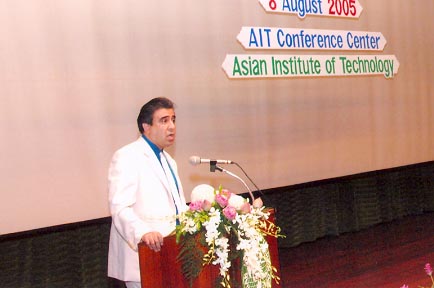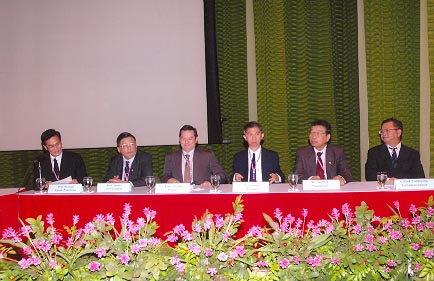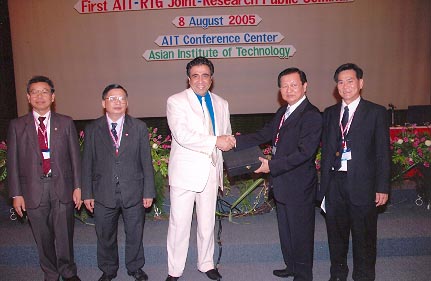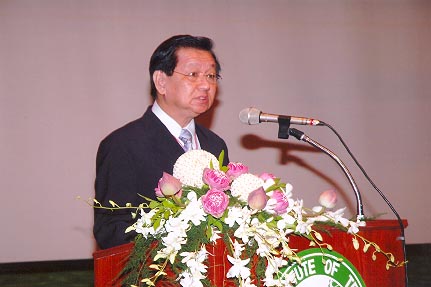First Public Seminar on RTG-AIT
Joint Research Projects
Students, faculty, as well as researchers from AIT and other universities and institutions nationwide attended the First Public Seminar on RTG-AIT Joint Research Projects, held on 8 August 2005 at the AIT Conference Center. The public seminar was organized to disseminate the results of the joint research projects conducted between AIT and state universities in Thailand, as part of the support from the Royal Thai Government during Fys2002 and 2003 to a wider public.

Before the presentation of the join research projects, Prof. Said Irandoust, the new President of AIT, presented his vision on AIT Towards Excellence, followed by a keynote lecture on Thailand's Vision on Science and Technology through Research by Prof. Pavich Tongroach, Secretary-General of the Commission on Higher Education. Thereafter, panel discussions were conducted on Thailand's Road to Technology Self-Reliance by noted academicians including Prof. Adulya Viriyavejakul, President, Mahasarakam University; Dr. Suchart Muangkaew, Deputy Secretary-General, the Higher Education Commission, Ministry of Education, Royal Thai Government; Prof. Suthat Yoksan of Srinakharinwirot University; Prof. Tatchai Sumitra, Former President, Chulalongkorn University; Assistant Prof. Vudhipong Techadamrongsin, Deputy Director, The Thailand Research Fund; and Prof. Worsak Kanok-Nukulchai, RTG Faculty Representative, AIT.

AIT President, Prof. Said Irandoust, during his presentation of vision on 'AIT Towards Excellence', noted that the university plays a major role in the development of its immediate region, and in promoting the region internationally. Co-operation with local and regional business and industry is an essential concept of the modern university. He also emphasized that he is in favour of societal perspective on science in which universities, as entrepreneurial institutions, are arenas in which knowledge is an intangible asset that increases when applied to different needs.

'The scale and standard of research play a major role in the development of the universities and their role in community economic development. Actively involving students in research and development activities trains them in research methods and enables them to develop more sophisticated conceptions of learning.
'In my opinion, the most promising orientation of a modern university should be based on education and research towards the sustainable development of the region, strengthening the knowledge, development and business capacity of the region, supporting the community economic development and its integration into the global economy,' AIT President added.
Prof. Said Irandoust summarized that in his opinion there is a need to
- create a university, through public and private sector partnership to reduce the possibility of wasteful competition and duplication, according to so-called Triple Helix constellations, a specific form of a network, meaning a form of co-operation that links actors, resources and activities together.
- build a consensus among the stakeholders (e.g. government, private sector, and community) sharing the same vision and working towards accomplishing the same objectives.
- encourage stronger involvement of key stakeholders and encourage the mobility of staff between the university and its stakeholders.
- develop new profession-driven academic courses and programs that are practical, relevant, and useful in the light of ongoing developments within various professions.
- as a profession-driven research orientation is a must as well as enhancing research activities that would serve as precursors to development issues and problems.
- tighten the relationship between education, research and the economy.
- train research managers to secure an optimal utilization of resources, to balance individual autonomy and organizational control, to balance the various perspectives on science, and to reduce complexity.
- to reward and encourage productive engineering research, quality assessment measures need to look beyond the indicators that are relevant to the academic community such as publications, by considering the research outputs in relationship to the various communities that use the results.
- to discuss continuously ethical and moral values in the light of contradictory values brought about by developments.
- allow multiculturality to be a positive force.
- funding should be ensured to finance the enabling infrastructure requirements of the initiative. Have a system to take care of new ideas and support risk-takers.
Prof. Irandoust concluded his opening remarks by referring to what Morita has said on Science and Engineers (Ref.: Measuring Excellence in Engineering Research, ISBN 1 871634 86 5): 'I believe that technology comes from employing and manipulating science into concepts, processes and devices. These in turn can be used to make our life or work more efficient, convenient and powerful. So it is technology, as an outgrowth of science, which fuels the industrial engineer. And it is engineers, not scientists, who make technology happen.'

During his keynote lecture, Prof. Pavich Tongroach (above), told the audiences about Thailand's national policies on science and technology development.
'Thailand's vision is to position herself as a regional hub for development of science and technology. Along this line, research plays a central role by both supporting research on modifying and improving existing technology, and reforming the research and development paradigm which can be promoting collaboration between the public and private research institutes, universities, including stimulating multinational co-operations to increase research and development activities and technology transfer. Flexibility in conducting research and transfer of technology has been, therefore, facilitated.
'Among the key strategies identified in the National Strategic Plan on Science and Technology (2004-2013) are the production of manpower in the area of science and technology to response to the country's economic and social demand and to contribute to the knowledge-based society; and the development of infrastructure and institutions to stimulate and support science and technology development and innovation, e.g. development of Centers of Excellence, development of existing science parks and establishment of the new ones. The production of more scientists and researchers to produce R&D; personnel with the ratio of 10 for 10,000 population has been targeted to enhance the national capacity in science and technology development,' Prof. Pavich added.
Prof. Pavich also noted that the 'clustering approach' has been introduced as a new paradigm for the development of science and technology. The main components of clusters are private firms, knowledge-producing agencies (universities/research institutes), and customers. An example of clusters is the Thailand Science Park which is located near Thammasat University Rangsit Campus and AIT, now involving 23 companies (one Singaporean, two Japanese, and 20 Thai), with 13 more waiting for approval and one applying for long-term leased land. It is affiliated with all major national research centers operated under the umbrella of NSTDA (namely; BIOTEC, MTEC, NECTEC, NANOTEC) and has space for the private sector for incubator units, multi-tenant buildings, and long-term leased land. Its three-year projection features 200 companies, with 4000 knowledge workers and an annual turnover of US$100 million. This project extension also involves links with five industrial estates (namely; Hi-tech, Bangkradi, Nawanakorn, Rojana, Bangpa-in) and their three major industrial sectors, namely, food, automobile, and ICT. In the future, other Science Parks have been planned to be established in Chiang Mai, Khon Khaen and Nakhon Si Thammarat.
Prof. Pavich also disclosed that the Commission on Higher Education (CHE) has initiated the Cooperative Research Network or CRN to encourage pulling of resources from both public and private sectors to cooperate with university in developing combined research and academic curriculum for the establishment of high quality research based postgraduate programs. At present 55 CRNs were formed in a wide range of disciplinary areas--medical science, engineering, nanotechnology, biotechnology, languages and tourism, etc. Another attempt of CHE in promoting research and development in the universities is the establishment of the Centers of Excellence to strengthen postgraduate education and research in cooperation with industry and the private sector as a means to building a strong foundation for research and development in seven priority areas that would help support the country's economic competitiveness.
According to Prof. Pavich, there have been the initiation of the idea to create University Business Incubator (UBI) and Technology Licensig Offices (TLOs) to support the commercial application of the research findings to generate economic benefits and build up the competitive capacity of the country. UBI will serve as the driving force for the establishment of a start-up company which could later be developed into spin-off business establishments. Last year, 25 universities have been funded by the Commission to create their UBIs, with more additional number of applications on the cue for consideration. TLOs has the aim to formulate and implement policy on university intellectual property and dealing with knowledge management both from outside-in and inside-out so as to create new business or business innovation as well as formulate universities' research and development directions which correspond with the country's research and development strategy.
Thirty-one joint research projects mostly in the field of technology were presented at this public seminar in English under 3 themes: (1) Computer and Information Technologies (2) Technology for Living Environment, and (3) Management of Resources and Development.
Computer and Information Technologies
|
Code |
Topic |
AIT |
Partner Institute(s) |
|
RTG-0201 |
3D Digital City |
Dr. |
Dr.Ing. Phisan Satitamnont |
|
RTG-0303 |
Application |
Dr. M. Nadarajah |
Dr.Sotdthipong Phichaisawat (CU) |
|
RTG-0203 |
Automated |
Prof. |
Dr.Chuleerat Iaruskulchai (KU) |
|
RTG-0305 |
Destination |
Dr.Vatcharaporn Esichaikul |
Dr.Ranee Esichaikul (STOU) |
|
RTG-0307 |
Design |
Dr. Manukid Parnichkun |
Dr.Ratchatin Chancharoen (CU) |
|
Coffee Break |
|||
|
RTG-0204 |
Development |
Dr. Voratas Kachitvichyanukul |
Dr.Puchong Utayopas (KU) |
|
RTG-0208 |
Information |
Dr. Soparth Pongkwan |
Dr. Sripen Durongdej |
|
RTG-0311 |
IP |
Prof. Kanchana Kanchanasut |
Dr. Sukhumal Imudom (KU) |
|
RTG-0313 |
Near |
Dr. K. |
Dr. Hansa Vathananukij (KU) |
|
RTG-0318 |
Real-time |
Dr. N. |
Dr.Ing. Phisan Santitamnont |
